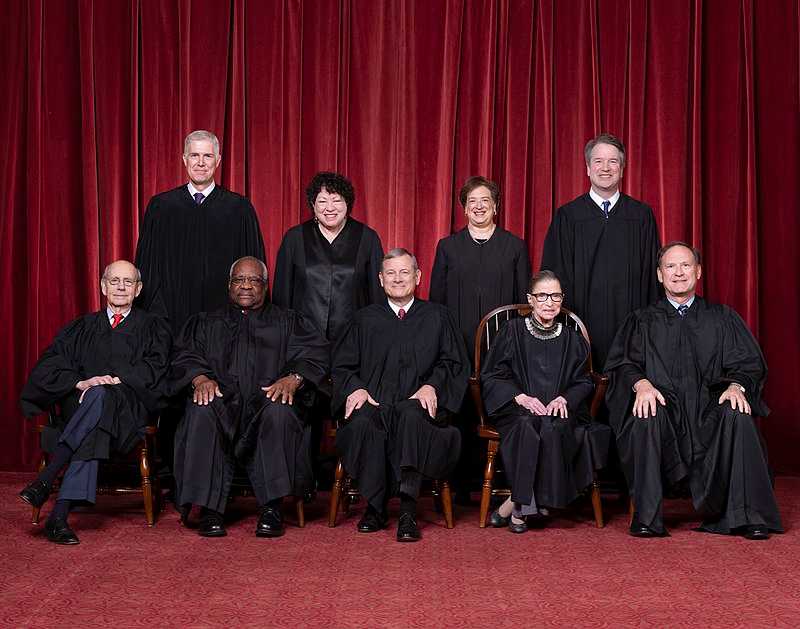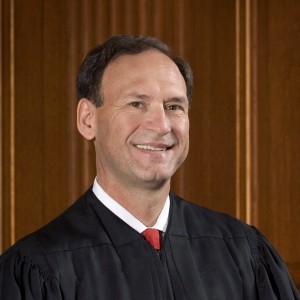Supreme Court Rules ‘Transgenders,’ Such as Men Who Want to Wear Skirts, Cannot Be Fired in 6-3 Decision
 WASHINGTON — In a landmark 6-3 Supreme Court decision today, which was written by Trump-nominated, conservative Justice Neil Gorsuch, the high court ruled that a civil rights law protects both homosexual and “transgender” people from what it considers “job discrimination” in employment. One of the cases involved surrounded a funeral home that fired a man who wanted to wear a skirt uniform at work.
WASHINGTON — In a landmark 6-3 Supreme Court decision today, which was written by Trump-nominated, conservative Justice Neil Gorsuch, the high court ruled that a civil rights law protects both homosexual and “transgender” people from what it considers “job discrimination” in employment. One of the cases involved surrounded a funeral home that fired a man who wanted to wear a skirt uniform at work.
The court decided that a section of the Civil Rights Act of 1964, known as Title VII, which bars job discrimination on the basis of sex, among other traits, may be read to include homosexual and “transgender” employees.
“An employer who fires an individual for being homosexual or transgender fires that person for traits or actions it would not have questioned in members of a different sex. Sex plays a necessary and undisguisable role in the decision, exactly what Title VII forbids,” Justice Neil Gorsuch wrote for the court.
He noted that the decision did not delve into what rights religious employers may or may not have, citing that R.G. & G.R. Harris Funeral Homes, which was represented by the religious liberties group Alliance Defending Freedom (ADF), “declined to seek review of [an] adverse [Religious Freedom Restoration Act] decision, and no other religious liberty claim is now before us.”
“So while other employers in other cases may raise free exercise arguments that merit careful consideration,” Gorsuch wrote, “none of the employers before us today represent in this court that compliance with Title VII will infringe their own religious liberties in any way.”
Christian News Network has inquired why the religious liberties aspect was not pursued before the high court. This article will be updated if and when a response is received.
The Supreme Court, however, did express that it is “deeply concerned with preserving the promise of the free exercise of religion enshrined in our Constitution” and pointed to a congressional exception in the law for “religious organizations.”
It is not clear if those organizations include for-profit businesses or if the protections only extend to churches and non-profit charitable and educational groups.
The three justices who dissented from the majority opinion were Samuel Alito, Clarence Thomas and Brett Kavanaugh. John Roberts and Neil Gorsuch sided with their liberal colleagues.

Alito wrote a sharp dissent lamenting that the court had seemingly usurped the role of the legislature.
“There is only one word for what the Court has done today: legislation,” he stated. “The document that the court releases is in the form of a judicial opinion interpreting a statute, but that is deceptive.”
Alito also expressed concern that the decision will have “far-reaching consequences” as more than 100 federal statues prohibit discrimination on the basis of sex. He worried what might become of the issue of the use of locker rooms and restrooms by those who identify as the opposite sex.
“[B]y intervening and proclaiming categorically that employment discrimination based on sexual orientation or gender identity is simply a form of discrimination because of sex, the Court has greatly impeded — and perhaps effectively ended — any chance of a bargained legislative resolution,” he wrote.
“Before issuing today’s radical decision, the court should have given some thought to where its decision would lead,” Alito chastised. “As the briefing in these cases has warned, the position that the court now adopts will threaten freedom of religion, freedom of speech, and personal privacy and safety. No one should think that the court’s decision represents an unalloyed victory for individual liberty.”
ADF issued similar remarks, outlining in a statement, “Redefining ‘sex’ to mean ‘gender identity’ will create chaos and enormous unfairness for women and girls in athletics, women’s shelters, and many other contexts.”
“Civil rights laws that use the word ‘sex’ were put in place to protect equal opportunities for women,” it explained. “Allowing a court or government bureaucrats to redefine a term with such a clear and important meaning undermines those very opportunities — the ones the law was designed to protect.”
BACKGROUND
 As previously reported, the U.S. Supreme Court heard three appeals cases surrounding the matter of homosexual and transgender discrimination in employment practices, including the Harris Funeral Homes lawsuit, which involves an explicitly Christian-based funeral home.
As previously reported, the U.S. Supreme Court heard three appeals cases surrounding the matter of homosexual and transgender discrimination in employment practices, including the Harris Funeral Homes lawsuit, which involves an explicitly Christian-based funeral home.
“R.G. & G.R. Harris Funeral Homes recognize that its highest priority is to honor God in all that we do as a company and as individuals,” the company’s website states. It also features a quote from Matthew 6:33, in which Jesus taught that men should “seek first the kingdom of God and His righteousness.”
In 2007, Anthony Stephens was hired as the funeral director and embalmer for the funeral home and presented himself as a man at that time. Six years later, Stephens informed his employer that he had been diagnosed with gender dysphoria and would therefore desire to wear a woman’s suit for work.
However, owner Thomas Rost, a Christian who serves on the board of directors for Salvation Army of Metro Detroit, has a company dress code in place, which states that males must wear dark suits and white shirts.
Because Stephens sought to wear female clothing, which is a violation of the dress code, and because Rost did not feel comfortable with providing a skirt suit due to his Christian convictions, Stephens was let go.
He consequently took the matter to the federal Equal Employment Opportunity Commission (EEOC), which sued Rost with the aid of the American Civil Liberties Union (ACLU) in alleging gender discrimination.
“R.G. employees understand that the dress code requires funeral directors to wear company-provided suits,” attorneys for Rost outlined in a legal brief. “Rost sincerely believes that he would be violating God’s commands if he were to pay for or otherwise permit one of RG’s funeral directors to wear the uniform for members of the opposite sex while at work.”
CONFLICTING DECISIONS

In August 2016, U.S. District Judge Sean Cox sided with the funeral home and dismissed the EEOC’s legal challenge.
“The court finds that the funeral home has met its initial burden of showing that enforcement of Title VII, and the body of sex-stereotyping case law that has developed under it, would impose a substantial burden on its ability to conduct business in accordance with its sincerely-held religious beliefs,” he wrote.
However, the Sixth Circuit Court of Appeals disagreed with Cox’s ruling and overturned the decision the following year.
“Discrimination against employees, either because of their failure to conform to sex stereotypes or their transgender and transitioning status, is illegal under Title VII. The unrefuted facts show that the funeral home fired Stephens because [he] refused to abide by [his] employer’s stereotypical conception of [his] sex, and therefore the EEOC is entitled to summary judgment as to its unlawful-termination claim,” wrote Judge Karen Nelson Moore on behalf of the unanimous panel.
The case was then appealed to the U.S. Supreme Court. Stephens died last month following a lengthy battle with kidney disease.
One of the other cases before the court, Zarda v. Altitude Express, centered on skydiving instructor Donald Zarda, who was fired by his employer following a complaint from the boyfriend of a female diver.
“Zarda often informed female clients of his sexual orientation — especially when they were accompanied by a husband or boyfriend — to mitigate any awkwardness that might arise from the fact that he was strapped so tightly to the woman,” legal documents surrounding the matter outline.
Altitude Express told Zarda that he was fired because he “failed to provide an enjoyable experience for the customer” as David Kengle, the boyfriend of Rosanna Orellana, complained to the company about Zarda’s remarks.
Zarda sued his employer in 2010 for discrimination, but died in a skydiving accident before the matter went to trial.
The U.S. Department of Justice filed an amicus brief last August, writing, “Congress has specifically prohibited gender identity discrimination in multiple other statutes that the Department of Justice will continue to enforce vigorously. But Congress has not taken that step in Title VII. Unless and until it does so, the proper role of the executive, and of this court, is faithfully to enforce the law as written.”
200 corporations asked the court to read homosexuality and gender identity into the law, including Amazon, American Express, AT&T, Ben & Jerry’s, Best Buy, Coca-Cola, CVS Health, eBay, Etsy, Facebook, General Motors, Google, IKEA, KIND Healthy Snacks, Levi Strauss & Co., Lyft, Macy’s, Marriott International, Microsoft, Nike, PayPal, Pinterest, Procter & Gamble, Starbucks Corporation, State Farm Mutual Auto Insurance, T-Mobile, Vimeo, The Walt Disney Company, Wells Fargo and Zillow.
2 Chronicles 5:6-7 states surrounding judges, “Take heed what ye do, for ye judge not for man but for the Lord, who is with you in the judgment. Wherefore now let the fear of the Lord be upon you, take heed and do it, for there is no iniquity with the Lord our God …”
Become a Christian News Network Supporter…







Comments are closed.